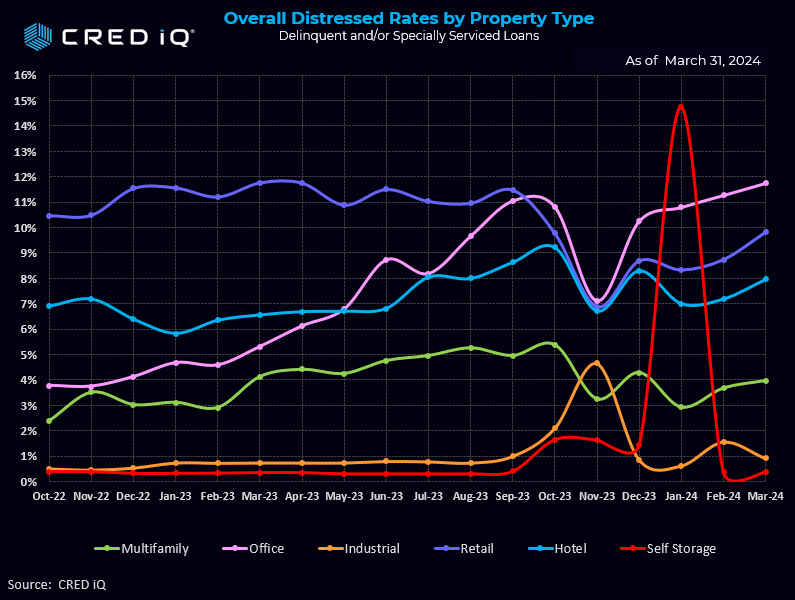The CRED iQ research team completed its monthly top-down evaluation of payment statuses reported for each loan, along with special servicing status to compute our distress rate
CRED iQ’s distress rate for all property types increased 26 basis points in March from 7.35% to 7.61%, a new all-time high. Following modest decreases in 3 of the last 4 months (net reduction of 18 basis points during that period). The latest print seems to counter that trend.

Retail’s distress rate earned the largest monthly increase with 108 basis points—the largest such increase in that sector since December 2023. A key factor was the $158 million loan backed by the Miami International Mall which failed to payoff at its February 2024 maturity date, thus impacting the rise of retail distressed rates. Servicer commentary indicates a forbearance agreement for one-year through February 2025 has been established. The 306,855-SF super-regional mall is located in the Miami Airport submarket reported a 2.34 DSCR for yearend 2023.
The Hotel segment distress rate increased to 7.7% from 6.9% in February, earning them second highest increase in this print. Partially driving the increased hotel distress rate is the 164-room, Hilton Garden Inn Cupertino limited-service hotel in the San Jose market. The asset is backed by a $32.0 million interest-only loan that transferred to the special servicer in March due to imminent monetary default prior to its December 2024 maturity date. The nine-month financials from September 2023 reported the hotel was performing at a 63.7% occupancy and a 1.27 DSCR.
The Office sector notched its fourth consecutive distress rate increase and continued its status as the property type with the highest distress rate
Within the self-storage sector, as previously reported, the overall distress rate declined primarily due to a large self-storage portfolio ($2.1B) loan’s payment status became current in February. This explains the wild temporary swing in this normally low distress property type.
Underlying CRED iQ’s distress rate, the CRED iQ Specially Serviced rate rose 34 basis points to 7.38% while the Delinquent print shaved 1 basis point.
CRED iQ’s distress rate aggregates the two indicators of distress – delinquency rate and specially serviced rate – yielding the Distress rate This includes any loan with a payment status of 30+ days or worse, any loan actively with the special servicer, and includes non-performing and performing loans that have failed to pay off at maturity.
Distressed Loan Payment Status
About a quarter of the distressed loans are non-delinquent with 21.1% being current and 8.0% being within the grace period or less than 30 days late.
A majority of the distressed loans (37.1%) are past their maturity dates and have stopped making monthly payments. On the other side, 10.3% are past their maturity dates, but still make their monthly mortgage payments on time. Measuring delinquency during loan terms prior to maturity dates, CRED iQ calculated 23.6% of the distressed loans are reporting between 30 days to 120+ days delinquent.
About CRED iQ
CRED iQ is a commercial real estate data, analytics, and valuation platform providing actionable intelligence to CRE and capital markets investors. Subscribers use the platform to identify valuable leads for leasing, lending, refinancing, distressed debt, and acquisition opportunities.
The platform also offers a highly efficient valuation engine which can be leveraged across all property types and geographies. Our data platform is powered by over $2.0 trillion in transactions and data covering CRE, CMBS, CRE CLO, Single Asset Single Borrower (SASB), and all of GSE / Agency.